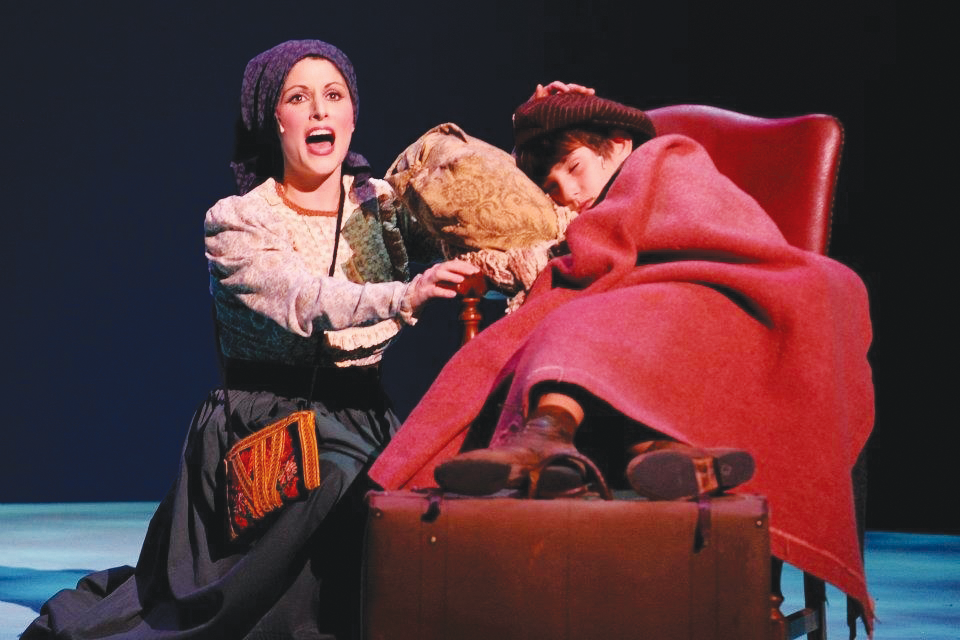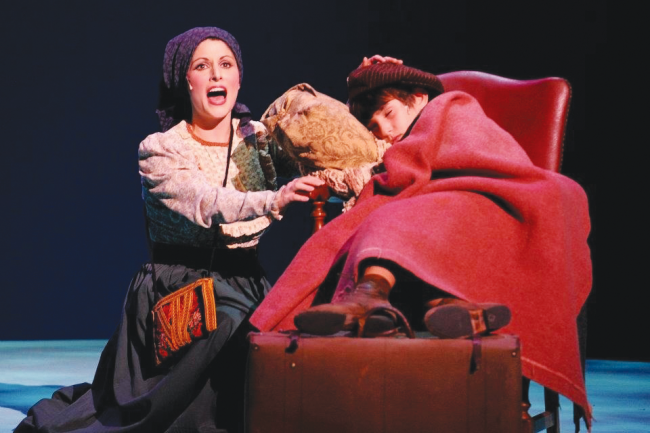
Amanda Passanante and Chet Monday in a number from “Rags,” Irving’s Lyric Stage’s newest show. (Courtesy of Micheal C. Foster)
“Rags” isn’t like most coming -to-America stories that we have come to know.
Instead of painting pictures of freedom, glory and patriotism, “Rags” stages the lives of Russian immigrants, who, after venturing to America, are treated like garbage.
“Rags” is a based on a book by Joseph Stein. It’s music and lyrics comes from artist Charles Strouse and Stephen Schwartz respectively.
The story focuses on Rebecca and her son David, two immigrants struggling to find a place in this new world full of purported promise.
As Rebecca searches for her husband and tries to keep things together for her son, she must prove that she is more than just a pile of rags on a boat from the east.
“Rags” opened on Broadway in 1986 and was nominated for multiple Tony Awards, including Best Musical.
This cast was bursting at the seams with talent and heart.
Kristin Dausch did a fabulous job as Bella, a friend of Rebecca’s who yearns to leave her room and explore her new world, against her father’s wishes. Actually, Dausch did not act out the role of Bella, she was Bella.
Every action had purpose, every emotion was genuine, every ballad was pitch-perfect and every moment was one of disco
very.
Dausch’s moments on stage, particularly her reprise of “Rags” and scenes with her love interest, Ben (Jonathan Bragg), were magic.
The onstage chemistry between Dausch and Bragg was phenomenal: not only does the audience believe that they’re in love, but they also desperately want for them to be happy together.
There is a fine line between acting a character and embodying one, and Dausch’s performance soars above the latter.
The entire house owed a tremendous amount of applause to Amana Passanante as Rebecca, as she carried the show.
Rebecca is in almost every scene, every song and has more than enough solo ballads.
What shines about Passanante’s performance is the fire in her eyes.
Rebecca’s chief concern is the care of her son David, and every action the audience sees is so visibly and authentically driven by the love she has for her son.
She seems on the verge of giving up her life for him, desperate in every scene, and it is that beyond-the-text investment in her character that makes her so believable.
Rebecca is the backbone of the show, and Passanante carries the weight with grace, skill and tremendous passion.
Jackie L. Kemp as Avram, Bella’s father, fills the stage with the warmth and feeling of community as he defends his family traditions against the assault of his new environment.
When Avram lost something, you could see the loss in Kemp’s eyes.
Brian Hathaway as Saul, Rebecca’s new love interest (though she still searches for her husband), is charming, playful and exciting.
The audience sees Saul just as Rebecca sees Saul, and that drives the audience to become emotionally invested in him just as Rebecca does.
Bragg could not be a more perfect Ben. There’s an innocence and a sense of trust Bragg conveys in his performance and his final speech with Avram is one of the more powerful things.
However, the show is not without it’s faults.
The stage is very large and often completely empty with the exception of a few actors.
A similar staging problem arises when Rebecca sings her ballads.
Each one is staged exactly the same, with Rebecca standing in the middle of an empty blue-lit stage singing to the audience.
Why there is no variation in these songs in terms of staging is a mystery, but an added prop or set piece would give Passanante something to work with during her song.
All of her songs all feel exactly the same. A few key characters dropped or changed their accents through the show, but Rebecca, Saul, Bella, Ben, Avram, and other principles, did not.
However, these issues are few and far between, particularly in the second act, and director Cheryl Denson should be proud of such a moving production with such a powerful, well-conveyed message.
“Rags” features a 35-piece orchestra that is superbly led by Jay Dias.
The orchestra swallows the room from the moment the curtain rises and doesn’t let up until the last note is sung.
The staging issues aside, “Rags” is a fantastic show.
The actors’ performances not only draw you in, but also truly endear you to the character. It is this audience-actor chemistry that is so crucial for a story to be effectively told.
The audience does not just see immigrants on stage off a boat, a bunch of rags, as the Americans do, but they see them as people fighting for a new life.









